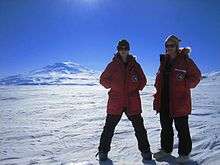Kelly Jemison
Kelly Jemison is an American academic geologist specializing in Antarctic diatoms. She studied at Florida State University. She has participated in the ANDRILL (ANtarctic geological DRILLing) project.[1][2][3] In 2011, she was awarded the Antarctica Service Medal.

Kelly Jemison (left) and Charlie King (right) stand at the base of Mt. Erebus, Antarctic (2006).
Publications
- Bohaty, Steven M.; Kulhanek, Denise K.; Wise, Sherwood W.; Jemison, Kelly; Warny, Sophie; Sjunneskog, Charlotte (2011). Anderson, John B.; Wellner, Julia S. (eds.). Tectonic, Climatic, and Cryospheric Evolution of the Antarctic Peninsula. American Geophysical Union. pp. 63–113. doi:10.1029/2010sp001049. ISBN 9781118667668.
- "Biostratigraphy and Paleoecology of the Calvert Formation, Eastern Maryland". 2012.
Contributions
- Kelly Jemison took part in the ANDRILL (ANtarctic geologic DRILLing) project as one of two undergraduate student from Florida State University . A project to find stratigraphic records using Cape Roberts Project. ANDRILL is a collaboration with Germany, Italy, New Zealand, the United Kingdom and the United States to understand the frequency, size, and pace of interglacial and glacial changes in Antarctica.[4][5]
- As a graduate student she studied microfossils at Florida State University.[6]
Accomplishments
- Geologist at Bureau of Ocean Energy Management since May 2011 - New Orleans, Louisiana
- Education: Florida State University: Graduate Teaching Assistant August 2009-May 2011
- Antarctic Marine Geology Research Facility-Florida State University 2005-2007
- Florida State University MS Geology and Earth Science 2003-2012
Awards
The Antarctica Service Medal; awarded by the United States Government. Aside from Kelly Jemison, only 11 others were awarded this honour since the award's conception in 1960 by the United States Congress . This distinction recognizes both military service personnel and civilians that served in Antarctica either for research or defence purposes benefitting the United States of America.[7]
gollark: I feel like we've argued about this before and you didn't say anything very convincing.
gollark: If they could do consistently *worse* than the market than their thing would actually be worth a lot.
gollark: The positions of the planets are very public.
gollark: I forgot the accurate statement but basically just "you can't beat the market on publicly available information".
gollark: Efficient market hypothesis.
References
- "Antarctic Marine Geology Research Facility". Archived from the original on 2011-07-24. Retrieved 2011-04-14.
- "Extraordinary Antarctic Ice Core Will Help Scientists Study Global Warming". ScienceDaily. 2007-04-26.
- "FSU draws international scientists to discuss global warming impact on Antarctic ice - Florida State University News". Florida State University News. 2007-04-25. Retrieved 2017-09-23.
- "About | ANDRILL". www.andrill.org. Retrieved 2019-02-07.
- "Extraordinary Antarctic Ice Core Will Help Scientists Study Global Warming". ScienceDaily. Retrieved 2019-02-07.
- Millen, Hana Terese (2012). "Biostratigraphy and Comparison of Paleocene to Lower Eocene Calcareous Nannofossils from Broken Ridge and Ninety-East Ridge". Cite journal requires
|journal=(help) - "The USAP Portal: Science and Support in Antarctica - Antarctica Service Medals and Certificates". www.usap.gov. Retrieved 2019-02-07.
This article is issued from Wikipedia. The text is licensed under Creative Commons - Attribution - Sharealike. Additional terms may apply for the media files.